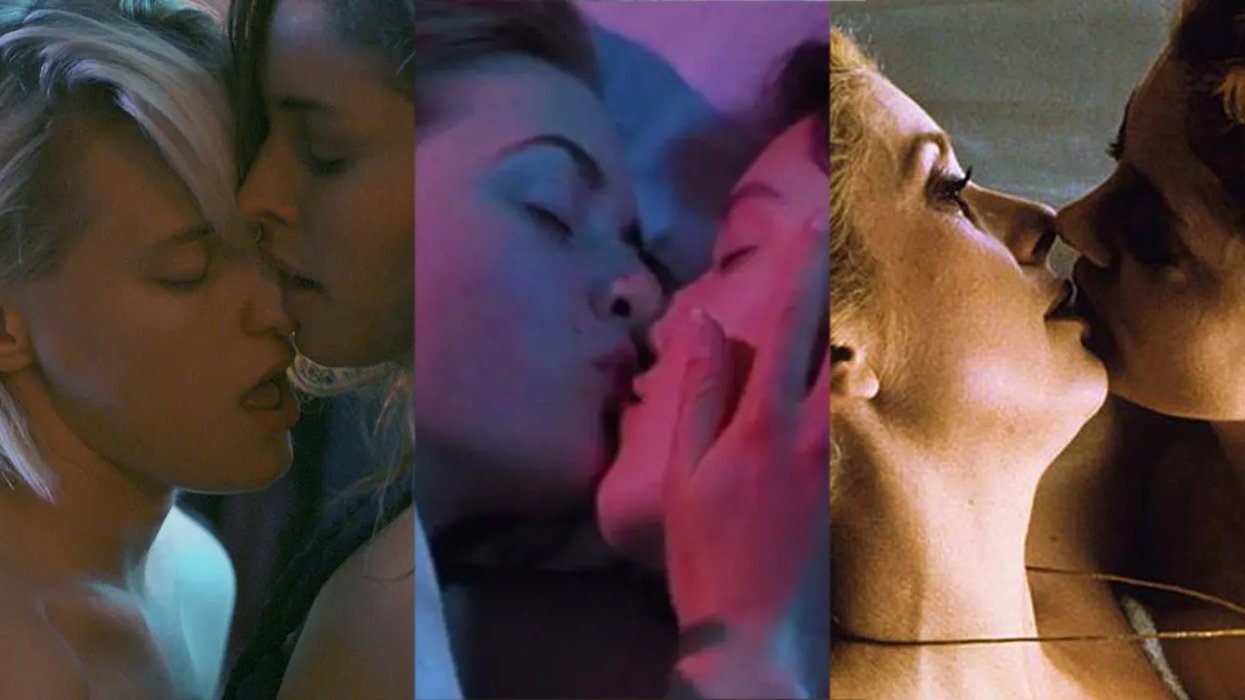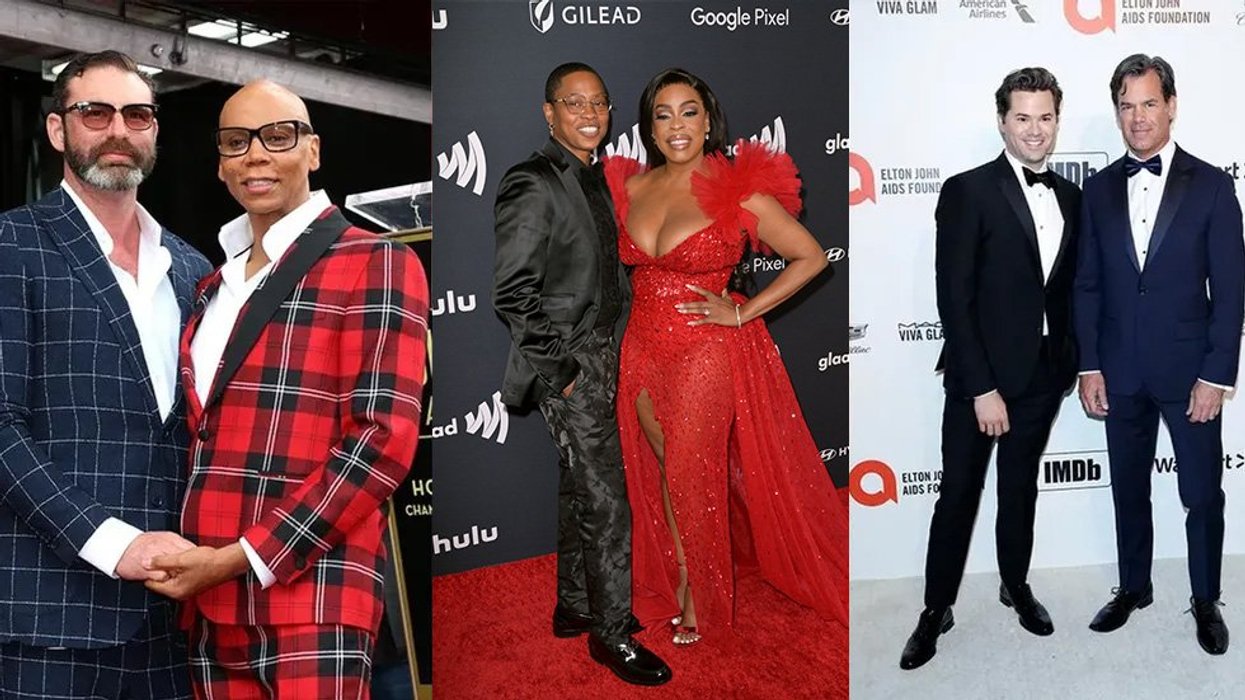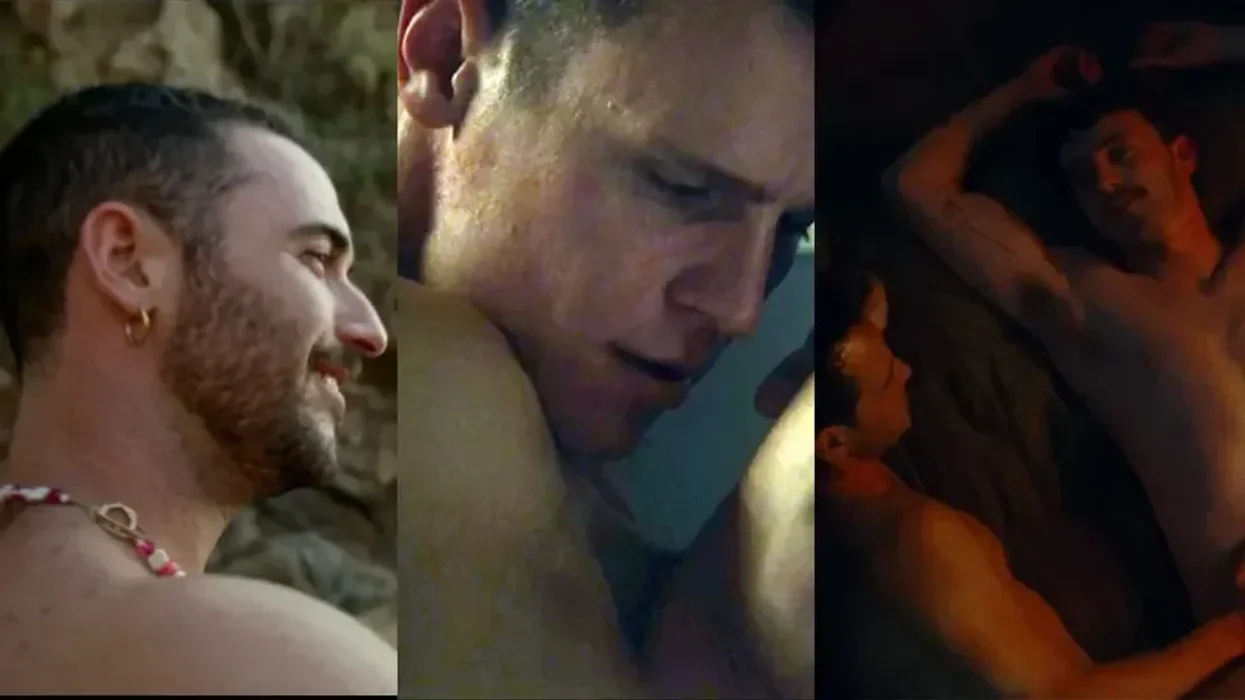In Medias Les: Humorous musings + critical theory + coming-out memoir
Long before I came out as queer -- before I told my family, my friends, or even just strangers on the Internet (hell – before I’d ever used the Internet), I had these chicks I loved named Legs, Maddy, Goldie, Rita and Violet.
Now, for context --we’re talking about my teen years in the early-mid 1990s. Way back then, there were few outlets for me, a young queer thing who didn’t quite know it yet, to examine or analyze my own sexuality. There were certainly no role models to turn to who were queer or questioning. I was happy to play “straight ally pal” to any out or half-out kids at school, and mostly tried to keep my own sexuality something that seemed as concretely hetero (if light on details) as possible.
Now – because everyone loves the laughing look back at one’s obvious deep-closet gayness - Exhibit A: The entire website Born This Way; Exhibit B: Clay Aiken’s early career; Exhibit C: Me
[photograph of the author looking very much the child lesbian in 1993, sitting on a stock car, in barn, in Maine]
In those quietly closeted times, I had Foxfire (1996) and the warm, fuzzy, and highly confusing feelings that came along with it. Of course, Angelina Jolie is now the widely accepted “universal boner” of hetero lady-crushes. But before her sex goddess status, before she became one-half of a fantasy threesome partnership Brangelina, there was Foxfire – a teen movie about fighting the Man, sticking together, and getting your girlfriends topless and tattooing their boobs.
The film is loosely based on a Joyce Carol Oates novel, Foxfire: Confessions of a Girl Gang, which I tried to read as a teen, but lost interest once I realized that the film’s sex appeal was noticeably absent.
Then again, how could the book possibly compete with moto-jacketed tomboy Angelina Jolie? She lets off a dizzying and distinctly queer vibe as Legs, the androgynous, mysterious bad girl who shows up from exactly nowhere. In the opening sequence alone she sneaks a weapon through a metal detector, is mistakenly called “young man” by a security guard and fights the good fight against animal cruelty. And that’s all in a school she doesn’t even attend! By the end of the film, she will have started a girl gang bent on stopping a sexually harassing teacher and showing the jocks on his football team what’s up. In summary: pure badassery.
And then there’s the gloriously ambiguous dialogue like the following:
Madeline 'Maddy' Wirtz: “I don't even know your name.”
Margaret "Legs" Sadovsky: “...she says the next morning.”
more on next page...
\\\
(continued)
To say that Angelina is the primary attraction would be to do the film a disservice. Foxfire provides a smorgasbord of teen crush hotness. For starters, it features Jolie’s then-girlfriend Jenny Shimizu (who has since been featured in Itty Bitty Titty Committee andPower Lesbians), playing the troubled, impossibly cool, gorgeously androgynous Goldie.
Hedy Buress purrs with a humble, yet pragmatic, “cool babysitter” vibe as Maddy as she cleans up all the messes her “good friend”/mysterious stranger Legs (Jolie) makes. Violet is a leggy, sexually advanced Goth-Anime goddess, for whom the very “now” issue of slut shaming takes front and center.
And last, but very certainly not least, future indie rock star Jenny Lewis (aka my truluv4eva) laughably plays “the chubby one,” Rita, who discovers her own sexual potential by singing a self-penned, BDSM-inspired song in a grocery store. The song, earnest and mortifying at the same time, feels uncomfortably close to the self-indulgent scribbling of my own adolescence:
Rita: Do you wanna come inside my house? Do you wanna show me things I've never seen before? I don't wanna tie you down, I just wanna tie you up. Do you wanna come inside my house?
Foxfire provided sufficient beautiful and amazing young women to lead even the most hetero girls wandering into the misty lands of “questioning.” Or so I imagined.
You can’t go back to Foxfire again, is how a famous quote goes. Misquoted cliché or not, the sentiment is absolutely true – watching it now is part nostalgia, part disappointment. Sure, the “hollaback,” budding-feminist, earnest, Oates-ian vibe makes this film slightly more palatable as a now-grown (if not quite “adult”) woman. But on re-watching, Foxfire certainly seems to have earned its low Rotten Tomatoes score through its occasionally cringe-worthy dialogue and tedious plot elements.
Silly plot aside, I could also fill an entire column talking about how whitewashed and racially problematic the film is – especially when it comes to eroticizing Goldie, the only non-white character, in ways that smack of Orientalism. The fact that her character has no agency throughout the film and is perpetually being rescued by the white protagonists is troubling to say the least. Additionally, the novel’s New York state, working-class setting has also been completely erased and replaced with upper middle-class women in Portland.
more on next page...
\\\
(continued)
Going back on my teen years in New Hampshire, the whitest place on earth, none of these criticisms would have ever occurred to me. I rented the VHS copy of Foxfire so many times from my small-town grocery store that they finally just hauled off and gave me their copy (I was the only person renting it, and had, embarrassingly, paid for it several times over in rental fees).
Foxfire was more than just a film to me – it was a lifeline, a world of possibility, and also the possible genesis of my unending love of redheads. It was a quiet oasis where my confusing girl-feelings could happily dwell, undisturbed – at least until one of my brother’s friends picked up my copy and started mocking me for owning this “lesbo movie” every time I saw him --for months. Don’t even ask what his reaction was when I shaved my head.
As it turned out, Foxfire was also a huge liability. Because it was a sign. A giant, obvious, gay billboard -- like a Bat Signal in the sky in the shape of a flame-shaped tit tattoo, along with an old-timey air-siren screaming out “gaaaaaaYYYYYYYYY............gaaaaaaaYYYYYYYYY”. At least, that’s what my internalized homophobia led me to believe. So, like my sexuality, I had to bury it.
Not bury it literally. I didn’t trash my copy (like so many half-scribbled, confessional, immediately torn up journals), but thereafter I made sure to keep the whole Foxfire thing under wraps. And after a few dozen more incidents like that one, I would spend at least another decade completely closeted. Funny how such little cuts can add up to a lifetime of silence.
Even though most of Foxfire can be interpreted as straight-up tale of hetero female friendship and empowerment, the subtext is comprised of the hardest, most throbbing teen girl boners that ever existed. Am I projecting? If so, I’m not the only one. Some users at IMDB go into deep analysis of the matter including the off-cited exchange:
Maddy: But you’re...and I’m not..
Implication made: You’re gay, I’m not. (Alternately: You’re a girl, I’m not gay). Then again, it could mean tons of things, right? Here are some other alternative readings I’ve come up with so far:
Maddy: But you’re a zombie, and I’m not into being eaten.
or:
Maddy: But you’re a tennis pro, and I’m only an enthusiast.
or:
Maddy: But you’re an existentialist, and I’m not down with Sartre.
When I got older, I realized that Foxfire could be used as a dog whistle reference when meeting women of undetermined sexual orientation (translation: it’s a good way to see if a lady’s down with the ladies). Because, like it or not, I never met any totally straight woman with the same rabid, devoted love of this small film as I have queer ones. And it’s always easier to out yourself when you’re talking about teen crushes. Looking back on what is undeniably the filmic equivalent of a queer lady Teen Beat, women would tell me unabashedly how much they loved it. How it helped them come to terms with their sexuality and woke up their desire for women. Every time I’ve heard that, I’ve felt the ring of recognition somewhere inside, and a bond with my fellow womyn who were once closeted (or not) teens in the 90s. Talking about Foxfire has helped me to let go of the fear of my own queerness. It opened up a world of sexual freedom, and one of bonding with other queer womyn over the ways in which this film rejoiced in girlhood and friendship and let them conquer over boys and hookups and The Man. A rare thing, even today.
Now I hear that there’s a new version of Foxfirecoming out this fall. While the trailer seems to be much truer to the novel (including using the original setting and time period), I am not sure how to feel about it. It’s taken my teen fantasy and ripped it asunder. I’m also mad jealous that as a fat performer there’s no way to go back in time and audition for the chubby girl part (come on - I could totally Luke Perry it, right?).
To sum up, I leave you with a quote from the ever-ambiguously gay duo of Maddy and Legs:
Maddy: If I told you that I loved you, would you take it the wrong way?
Legs: I'll take it however you want me to.
I feel the same way about Foxfire – even though I can’t go back to those heady days of closeted teenage frustration (nor would I, in a thousand years), I’ll take it as it is – flawed and silly, earnest and embarrassing, a perfect testament to my teenage closet.
Toronto-based Writer/Performer Catherine McCormick will be posting this column regularly, analyzing texts critical to her own queer journey, as well as taking recommendations of “classic” “queer” “texts” to “review” (with plenty of jokes and scare quotes to go around).
Like SheWired on Facebook.
Follow SheWired on Twitter.



























































































































